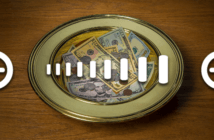I have come to see the importance of thinking about different segments within the congregation. There is tremendous diversity within any congregation when it comes to spiritual development and spiritual growth. One of the things that I have had to learn to do is to think about how we are connecting with each segment. Two examples on either end of the spectrum can illustrate what I mean.
In any given church you have fifteen to twenty clusters, shaped in part by their spiritual maturity. How are you connecting with the needs of each one of those clusters to help them grow the next step in terms of spiritual maturity and the stewardship that comes with such growth?
I have had to learn that whenever somebody gives a significant gift, I need to be alerted so I can call them on Monday to say, “thank you.“ Plus, I stay in touch with our lead givers. They don’t mind my knowing what they give, and they don’t mind my saying thank you. In fact, these gestures open the door for me to build on that relationship for other things.
But along with that, we keep in touch with the people who are giving very little. And what we have discovered is that the people who are giving at a very low level have one of two things going on. One is that they are economically disadvantaged. Well, that’s fine. It helps for us to be aware of that. What special ministry is needed with them? How do we help them give in a way appropriate for them? The other reason tends to be that they do not know Christ.
We have learned some things in reaching a lot of new Christians whose giving is disappointing given their ability. We realized that many of them had never been in church before. Most of them have never even really read the Bible before. We had to ask ourselves what we were doing to help them make sense of this new experience. So we started a number of Bible study groups. We did a church-wide “Read Your Way Through the Bible” during Lent where we take a chapter a day. These are wonderful people, but we realized that we have got to do some basic work about who Jesus is before any conversation on giving is going to be meaningful.
Now those are just examples, but the idea is to think that in any given church you have fifteen to twenty clusters, shaped in part by their spiritual maturity. How are you connecting with the needs of each one of those clusters to help them grow the next step in terms of spiritual maturity and the stewardship that comes with such growth?
These remarks were made at a conference sponsored by the Texas Methodist Foundation.






